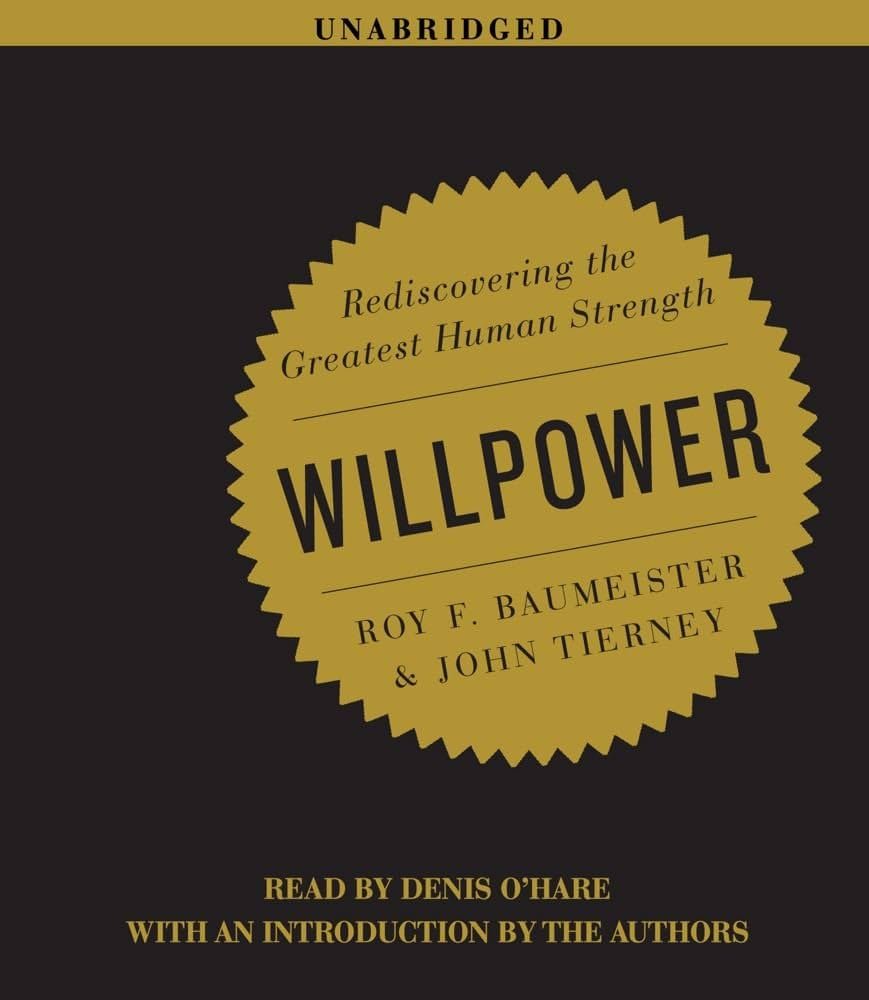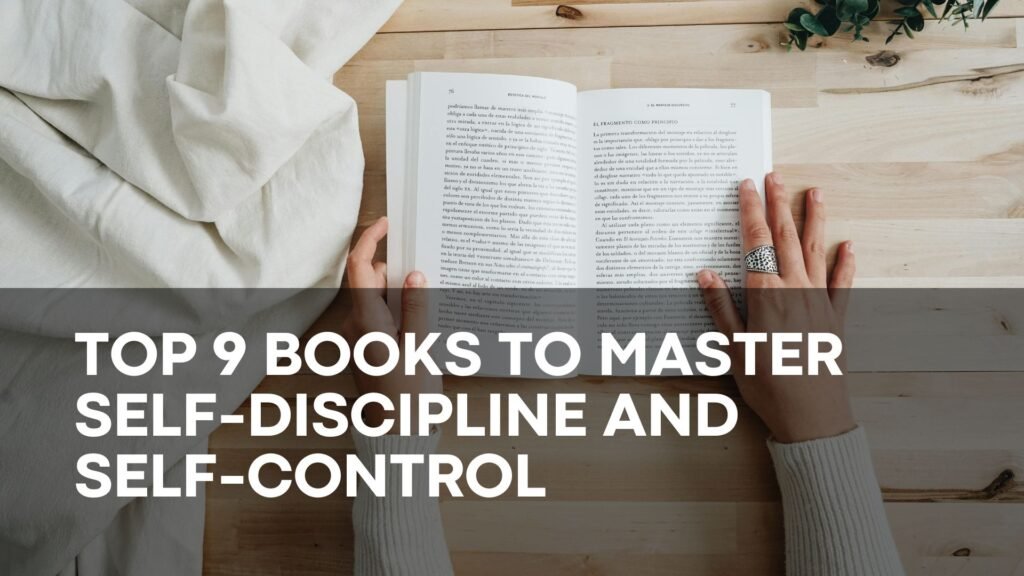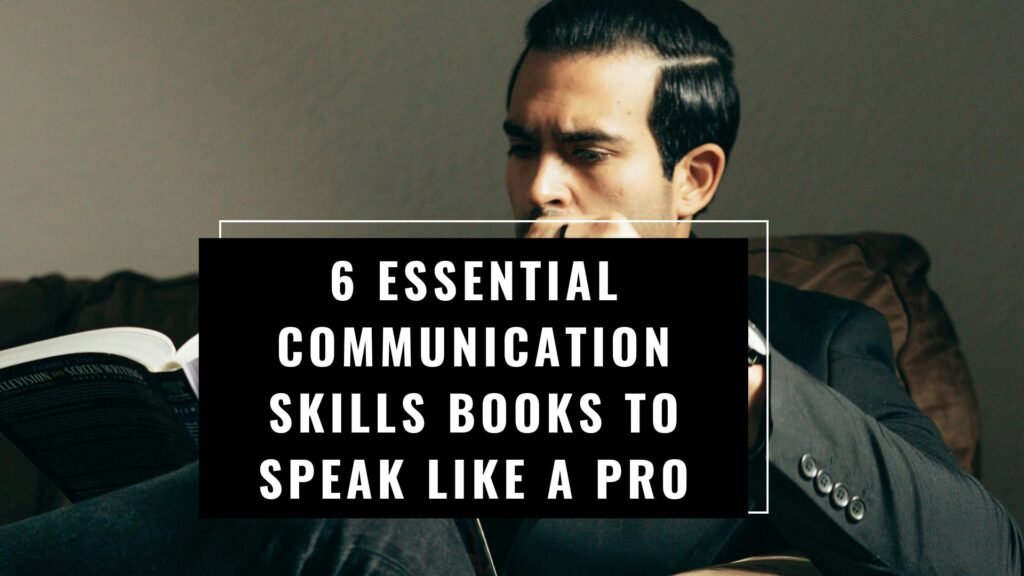Hey beautiful,
Do you know that most people fail at their goals because they lack self-discipline? They fail to manage things because they find it hard to control their selves from temptations.
But let me tell you: self-discipline is a skill you can learn, not a magical trait you’re born with.
In this article, I’ll introduce nine incredible books that will help you develop self-discipline and self-control.
Books to Master Self-Discipline and Self-Control
Each book provides practical advice and valuable insights to guide you on your journey. Let’s dive in.
1. “Willpower: Rediscovering the Greatest Human Strength” by Roy F. Baumeister and John Tierney

Do you feel like your willpower disappears by midday? This book explains why.
What You’ll Learn
- How to recharge and protect your limited willpower reserves
- Willpower is like a muscle that gets tired
- Your brain runs on glucose and it impacts your self-control
You’re not weak—you’re just human. And there are concrete ways to build your willpower muscle.
Practical Tips That Work
- Tackle hard tasks in the morning
- Use the Pomodoro Technique (25 minutes work, 5 minutes break)
- Keep healthy snacks nearby
- Set up a reward system for yourself
2. “Mindset: The New Psychology of Success” by Carol S. Dweck

In “Mindset”, Carol explores two types of mindsets: fixed and growth. She shows how these mindsets shape our behavior and success.
Fixed mindset people say: “I’m not good at this.” Growth mindset people say: “I’m not good at this YET.”
The difference? Everything.
Key Takeaways
- There are two mindsets: fixed and growth
- Your beliefs about your abilities dramatically impact your success
- You can train your brain to become more resilient
Best Practices and Tips
- Embrace challenges
- See criticism as a growth opportunity
- Celebrate effort, not just results
- Stop saying “I can’t” and start asking “How can I?”
3. “Self-Discipline in 10 Days: How to Go from Thinking to Doing” by Theodore Bryant

In “Self-Discipline in 10 Days”, Theodore Bryant presents a practical guide to building self-discipline.
The book outlines a step-by-step program with exercises and techniques to develop self-control in just 10 days.
What You’ll Learn
- Structured daily exercises
- Practical techniques to beat procrastination
- A step-by-step plan to go from thinking to doing
Best Practices and Tips
- Break big tasks into tiny steps
- Create a clear, achievable plan
- Track your progress religiously
- Reward yourself for small victories
4. “Eat That Frog!: 21 Great Ways to Stop Procrastinating and Get More Done in Less Time” by Brian Tracy

Your “frog” is your most challenging task. Do it first, and the rest of your day becomes a victory lap.
Brian Tracy offers 21 practical techniques to prioritize tasks and accomplish more in less time.
Key Takeaways
- Do your hardest task first thing
- Use time-blocking
- Eliminate distractions
- Set clear deadlines
The core message of the book is: Stop waiting. Start doing.
5. “The Marshmallow Test: Understanding Self-Control and How To Master It” by Walter Mischel

Imagine a room. A child. One marshmallow. Wait 15 minutes, get two marshmallows.
What would you do?
This book explains how delayed gratification shapes your entire life trajectory.
Powerful Lessons
- You can train your brain to wait for bigger rewards
- Delayed gratification predicts long-term success
- Small choices compound over time
Best Practices and Tips
- Practice Delayed Gratification: For example, wait a little longer before eating a treat.
- Use Distraction Techniques: When faced with a temptation, distract yourself with other activities.
- Set Clear Goals: Define specific, achievable goals to help you stay focused.
- Use Visualization Techniques: Visualize the benefits of waiting and achieving your goals.
- Monitor Your Progress: Keep a record of your successes and challenges.
6. “The Slight Edge: Turning Simple Disciplines into Massive Success and Happiness” by Jeff Olson

Success isn’t about grand gestures—it’s about consistent small actions.
In “The Slight Edge,” Jeff Olson highlights how small, consistent actions lead to significant success and happiness.
What You’ll Learn
- Daily habits create massive change
- Tiny positive choices compound (The Slight Edge Philosophy)
- Consistency beats intensity every time
How to Apply:
- Start with 10-minute daily habits
- Track your progress
- Stay consistently imperfect
7. “No Excuses! The Power of Self-Discipline” by Brian Tracy

Time to get real about your potential.
Brian Tracy examines how crucial self-discipline is for achieving success.
Key Takeaways
- Self-discipline is a skill, not a gift
- Your excuses are lies you tell yourself
- Personal responsibility is your greatest weapon
Best Practices and Tips
- Set clear goals
- Develop unbreakable daily routines
- Create accountability systems that force you to show up
8. “The Little Book of Big Change: The No-Willpower Approach to Breaking Any Habit” by Amy Johnson PhD and Mark Howard PhD

“The Little Book of Big Change” offers a novel way to break habits without relying on sheer willpower.
This book is about understanding the psychology behind your habits.
Key Takeaways
- Habits aren’t about force
- They’re about understanding your mental patterns
- Change happens through awareness, not struggle
Best Practices and Tips
- Recognize habit loops
- Interrupt automatic thought patterns
- Create new neural pathways
9. “Carrots and Sticks: Unlock the Power of Incentives to Get Things Done” by Ian Ayres

In “Carrots and Sticks,” Ayres reveals a simple truth: humans are motivated by both rewards and consequences.
Key Takeaways
- Use both Carrots and Sticks. Combine positive rewards with negative consequences to motivate behavior.
- Create personal stakes
- Make accountability fun
Best Practices and Tips
- Set up accountability contracts
- Create financial or social consequences for missed goals
- Design rewards that truly excite you
Also Read: “The 5 Best Time Management Books to End Time Wasting“
Conclusion
“Success is the sum of small efforts, repeated day in and day out.” — Robert Collier
These books aren’t just reading material—they’re your personal development arsenal. Each offers unique insights, but they share one crucial message: You have the power to change.
FAQs
How do you master self-control and discipline?
Set clear goals and create a plan. Take small, achievable steps and practice consistently.
What is the difference between self-discipline and self-control?
Self-discipline is about staying focused on long-term goals and pushing through challenges. Self-control is about managing your impulses and reactions in the moment. Both are important but work in different ways.
Why do I lack self-control and discipline?
Lack of self-control and discipline comes from poor habits, low motivation, or stress.
What are the 3 techniques of self-control?
Set clear and specific goals: This keeps you focused and lets you track your progress.
Use rewards and penalties: These motivate you to stick to your goals.
Practice mindfulness: This helps you become more aware of your impulses and manage them better.
What was the 1st book of discipline?
One of the earliest books on discipline is “The Art of War” by Sun Tzu. Written in ancient China, it focuses on strategy and leadership.
How do I strengthen my willpower?
Build your willpower by setting clear goals and practicing self-care. Gradually push your limits and use techniques like visualization and positive self-talk.








Thank you, I have just been looking for information approximately this topic for a while and yours is the greatest I have came upon till now. However, what in regards to the conclusion? Are you sure in regards to the supply?
You have brought up a very superb details, thankyou for the post.
Merely a smiling visitant here to share the love (:, btw outstanding layout.